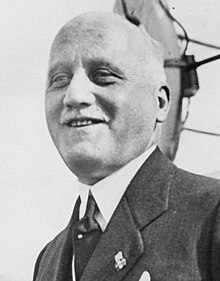Cavaliere Guido Jung | |
|---|---|
 | |
| Consigliere of Fascism | |
| In office July 1932 – January 1935 | |
| Duce of Fascism | Benito Mussolini |
| Italian Minister of Finance | |
| In office July 1932 – January 1935 | |
| Monarch | Victor Emmanuel III |
| Prime Minister | Benito Mussolini |
| Preceded by | Antonio Mosconi |
| Succeeded by | Paolo Ignazio Maria Thaon di Revel |
| In office February 1944 – April 1944 | |
| Monarch | Victor Emmanuel III |
| Prime Minister | Pietro Badoglio |
| Preceded by | Domenico Bartolini |
| Succeeded by | Quinto Quintieri |
| Personal details | |
| Born | 2 February 1876 Palermo, Palermo, Sicily |
| Died | 25 December 1949 (aged 73) Sicily[1] |
| Nationality | Italian |
| Political party | National Fascist Party[2] |
| Occupation | Merchant, politician |
| Civilian awards | |
| Military service | |
| Allegiance | |
| Branch/service | Royal Italian Army |
| Years of service | 1914–1917, 1935–1939, 1944–1945 |
| Rank | Lieutenant Colonel |
| Military awards | |
Guido Jung (2 February 1876 – 25 December 1949) was a successful Jewish-born Italian banker and merchant from Sicily.
He was a member of the Grand Council of Fascism and served as Italian Minister of Finance from 1932-35 under Benito Mussolini. Jung was an important player in international finance during the interwar period, leading Italian negotiations with the United States over tariff questions, heading Italo-German economic talks with Hermann Göring, and representing Italy at the London Economic Conference during which he was heralded in press reports for his diplomatic tact.
As Italy's alliance with Germany grew stronger, Jung was ultimately sidelined by Mussolini due to his Jewish heritage, despite reports from the Organization for Vigilance and Repression of Anti-Fascism that described him as a disciplined and loyal fascist. After the surrender of Italy, Jung briefly served as finance minister a second time – in 1944 – under Pietro Badoglio but was dismissed after three months following allegations concerning the extent and depth of his roots in the National Fascist Party. Though a fanatical fascist, Jung drew a sharp distinction between fascism and Nazism, once comparing the Nazi Party to a baby and later reportedly calling Adolf Hitler a "blockhead".
An artillery officer in the Italian Army during both world wars, Jung commanded troops in both Europe and Africa. For various acts of bravery in combat, he was decorated with the Silver Medal of Military Valor on four separate occasions. He was created a knight of the Order of the Crown of Italy by Victor Emmanuel III.